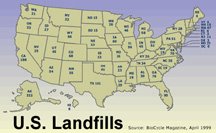Passing the smell test
The Akron Beacon Journal
PIKE TWP - Republic Waste Services of Ohio is anxious to cap the controversy emanating from its landfill in southern Stark County. To do so, the company has devised a plan to cover 88 acres of the 258-acre Countywide Recycling & Disposal Facility in Pike Township with a synthetic liner, in effect, snuffing out smoldering underground fires. The fires have triggered the odor problem that has afflicted neighboring communities for months.
Will Flower, a spokesman for parent company Republic Services Inc. of Florida, is hopeful the Ohio EPA will approve the plan. Engineers hired by Republic rejected two alternatives, excavating the 88 acres or injecting chemicals to put out the fires, as too costly or too risky. As it is, capping part of the landfill would take an estimated three to six years compared to at least 10 years for excavation.
Republic's plan deserves close scrutiny from the state EPA. The goal should be the elimination of the fires and the smells coming from the Countywide landfill. The company now says problems at the landfill are under control, odors abating. Yet it continues to characterize what is going on underground as a chemical reaction (subterranean fires violate its state permit). The time long ago passed for giving Republic the benefit of the doubt.
Critics of the landfill must now place their faith in the state EPA, trusting Director Chris Korleski to make the right decisions in his negotiations with Republic. Cost and speed of implementation are important factors in considering a remedy. It is most important that the fires go out and the smells stop.
Fortunately, the state EPA has assembled an impressive team of outside experts to evaluate the effectiveness of using a massive cap to block liquids and oxygen from feeding the underground burning. The trouble started in an area where liquid came into contact with aluminum wastes, something the previous dump operator warned should not happen.
If the excavation approach is too costly, in time and dollars, then Korleski must urge his experts to press Republic to ensure the adequacy of its plan. Three to six years is a long time to wait for a final remedy. For the sake of the surrounding residents, the fix eventually approved should fix the problem, not merely cover it over.
PIKE TWP - Republic Waste Services of Ohio is anxious to cap the controversy emanating from its landfill in southern Stark County. To do so, the company has devised a plan to cover 88 acres of the 258-acre Countywide Recycling & Disposal Facility in Pike Township with a synthetic liner, in effect, snuffing out smoldering underground fires. The fires have triggered the odor problem that has afflicted neighboring communities for months.
Will Flower, a spokesman for parent company Republic Services Inc. of Florida, is hopeful the Ohio EPA will approve the plan. Engineers hired by Republic rejected two alternatives, excavating the 88 acres or injecting chemicals to put out the fires, as too costly or too risky. As it is, capping part of the landfill would take an estimated three to six years compared to at least 10 years for excavation.
Republic's plan deserves close scrutiny from the state EPA. The goal should be the elimination of the fires and the smells coming from the Countywide landfill. The company now says problems at the landfill are under control, odors abating. Yet it continues to characterize what is going on underground as a chemical reaction (subterranean fires violate its state permit). The time long ago passed for giving Republic the benefit of the doubt.
Critics of the landfill must now place their faith in the state EPA, trusting Director Chris Korleski to make the right decisions in his negotiations with Republic. Cost and speed of implementation are important factors in considering a remedy. It is most important that the fires go out and the smells stop.
Fortunately, the state EPA has assembled an impressive team of outside experts to evaluate the effectiveness of using a massive cap to block liquids and oxygen from feeding the underground burning. The trouble started in an area where liquid came into contact with aluminum wastes, something the previous dump operator warned should not happen.
If the excavation approach is too costly, in time and dollars, then Korleski must urge his experts to press Republic to ensure the adequacy of its plan. Three to six years is a long time to wait for a final remedy. For the sake of the surrounding residents, the fix eventually approved should fix the problem, not merely cover it over.













